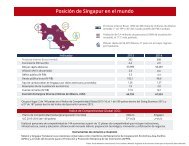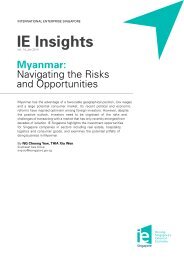basic-guide-to-exporting_Latest_eg_main_086196
basic-guide-to-exporting_Latest_eg_main_086196
basic-guide-to-exporting_Latest_eg_main_086196
You also want an ePaper? Increase the reach of your titles
YUMPU automatically turns print PDFs into web optimized ePapers that Google loves.
other business contacts) options r<strong>eg</strong>arding the use of their personal information.Cus<strong>to</strong>mers should have the opportunity <strong>to</strong> refuse having their personal informationshared with others or used for promotional purposes. Many countries have privacylaws, and organizations should take care <strong>to</strong> comply or they may face prosecution.For example, the European Union prohibits the transfer of personal data <strong>to</strong> non-EU nations that do not meet the EU “adequacy” standard for privacy protection.The U.S. Department of Commerce, in consultation with the European Commissionand the private sec<strong>to</strong>r, has developed a safe-harbor framework that provides U.S.organizations with a streamlined means <strong>to</strong> comply with the EU requirements.Companies may self-certify <strong>to</strong> the safe harbor at export.gov/safeharbor.SecurityConsumers often cite security concerns as a reason for not placing orders over theInternet. Compared with other forms of consumer purchasing, the Internet is safe—aslong as the online merchant takes prudent business precautions. If your companyoperates a transactional website as part of its <strong>exporting</strong> business, you should post asecurity statement <strong>to</strong> reassure cus<strong>to</strong>mers.Electronic SignaturesIn l<strong>eg</strong>al terms, an online sale is an enforceable contract, a valid and bindingagreement. However, in some overseas markets, a contract is enforceable only if it issigned “in writing.” Such jurisdictions do not recognize electronic signatures and, inthe event of a dispute, would not enforce an agreement made by e-mail or througha website. Although many countries have modified their laws <strong>to</strong> recognize electronicsignatures, online exporters should check <strong>to</strong> be sure their target markets acceptelectronic signatures. If they do, the next step is <strong>to</strong> determine which, if any, signaturesare restricted and which technologies are l<strong>eg</strong>ally valid.Unsolicited Commercial E-mailUnsolicited commercial e-mail (UCE), also known as unsolicited bulk e-mails (UBE) orspam, is relevant <strong>to</strong> international e-commerce because its use is controversial. Manybusinesses see UCE as a quick and cheap way <strong>to</strong> promote goods and services <strong>to</strong> abroad range of potential cus<strong>to</strong>mers. However, UCE costs individuals and businessessignificant amounts of time, money, equipment, and productivity. Many domestic andinternational jurisdictions have laws about UCE, and violation may result in penalties.In addition, many e-mail service providers, such as America Online and Yahoo!, haverules of conduct that forbid using their service <strong>to</strong> send UCE. For more guidance onUCE, please visit thedma.org.Advertising ContentMost countries have laws about advertising content, which may be applied <strong>to</strong>websites, banner ads, and marketing e-mails sent from the United States. Onlineexporters should research the advertising laws of their target market before initiating130U.S. Commercial Service • A Basic Guide <strong>to</strong> Exporting





